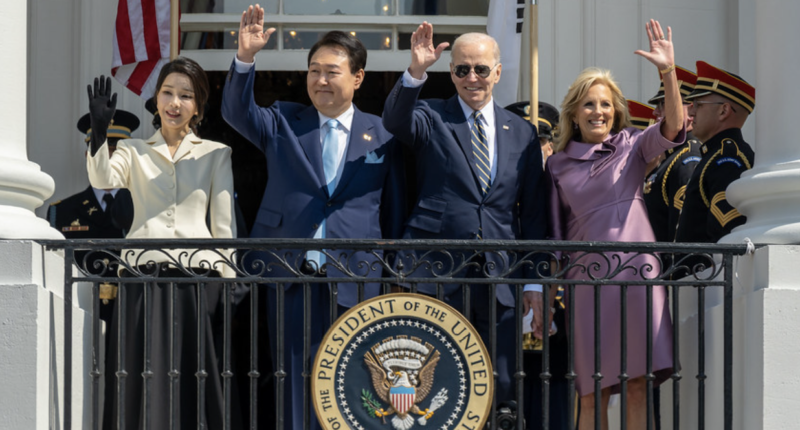In recent years, South Korea has faced rising pressure to acquire indigenous nuclear capability amid growing geopolitical hostility. The fundamental issue stems from its northern neighbor’s nuclear growth.
Reports now suggest that Pyeongyang’s nuclear arsenal can reach the U.S. homeland and penetrate its missle defenses. The Russian invasion of Ukraine has further reinforced Kim’s belief that nuclear weapons are critical to North Korea’s national security, prompting his adoption of a first-use nuclear doctrine. These developments sparked concerns among South Korean policymakers that Biden will not risk a nuclear strike on American soil to defend Seoul. In the event of a North Korean nuclear or conventional attack on the South, they suggest that the U.S. may renege on its security commitments to avoid entrapment in a nuclear war, casting doubt on the reliability of the U.S. nuclear umbrella.
This places South Korean President Yoon in a rather precarious position. On the one hand, a domestic nuclear program can guarantee the second-strike capability needed to deter Kim and appease 71% of the populace that has come to support the nuclear path. On the other hand, as nuclearization will reduce Seoul’s reliance on American protection and empower it to order U.S. troops off its territory, it risks antagonizing Washington and undermining Yoon’s pro-U.S. policy.
This begs the question: How might the Yoon administration navigate these tricky waters?
Yoon’s state visit to the U.S. in April provides a telling clue. The trip culminated in the announcement of the Washington Declaration: a bilateral treaty in which both leaders agree to expand joint conventional military exercises and nuclear coordination via a Nuclear Consultative Group and—most notably—dispatch an American nuclear ballistic submarine to South Korea. This latter move is intended to signal the reliability of Washington’s extended nuclear deterrence. Yoon hailed the agreement as a significant upgrade to the U.S.-South Korea security alliance.
In reality, however, the benefits for Seoul are questionable. As the submarine will be under American operational control, it fails to address the core concern of U.S. reliability. South Korea will continue to view Washington as unlikely to initiate a retaliatory strike on Pyeongyang for Seoul, marking no substantive improvement from the deterrence provided by nuclear weapons based on the U.S. mainland. Nuclear intel sharing and strategic planning also offer limited deterrence without a credible threat of nuclear retaliation. In contrast, the declaration sees Yoon formally commit to maintaining his country’s non-nuclear status, enabling Biden to sustain American security influence in the Asia Pacific to counter a rising China. It further prevents a potential nuclear arms race between South Korea and China that will severely undermine U.S. security.
The declaration thus represents a shallow treaty with limited effects on the status quo. It provides a temporary fix for both Yoon and Biden to alleviate Seoul’s security concerns without resorting to indigenous nuclearization but does not produce the second-strike capability that South Korea ultimately needs to ensure its long-term security. The continued expansion of Pyeongyang’s nuclear arsenal will inevitably deteriorate the reliability of U.S. security commitments and reinvigorate calls for a South Korean nuclear program. As long as the Kim regime remains nuclear-armed and hostile, it seems that procuring nuclear weapons under the direct control of South Korean forces is the only option.
For now, the Washington Declaration can only be viewed as a win for Washington, and a loss for Seoul.
Credits: The White House, Wilson Center, Explainers, BBC, Bulletin of the Atomic Scientists, The Korea Times









